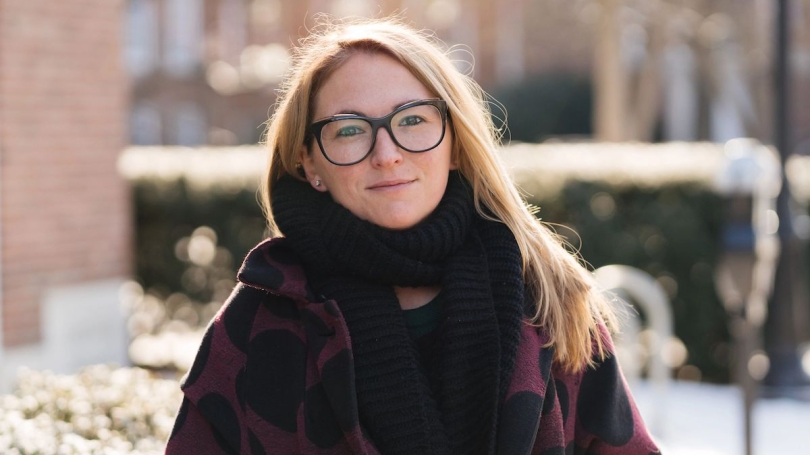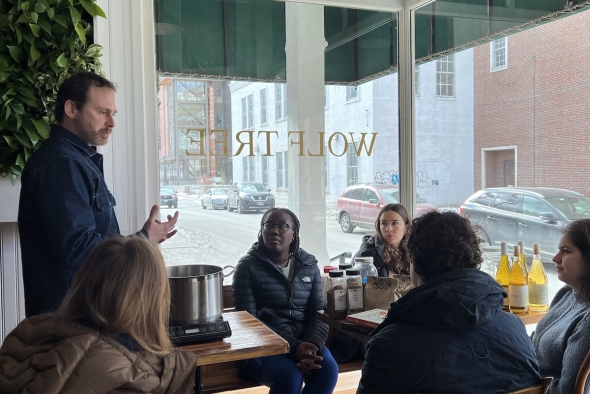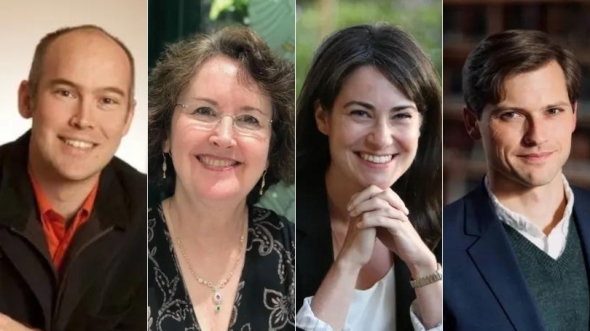

Professor Danielle Callegari will convene food and wine scholars, writers, purveyors, and aficionados at Dartmouth for a public symposium on Nov. 3 and 4.
Professor Danielle Callegari's first academic volume, Dante's Gluttons: Food and Society from the Convivio to the Comedy, explores how the celebrated Italian poet expresses the social, political, and cultural values of his time through food.
An assistant professor in the Department of French and Italian, Callegari brings together medieval Italian literature with food and beverage studies in her research and teaching.
She can also be found illuminating the historical and cultural context of food and wine in mainstream publications. Callegari serves as a writer at large for Wine Enthusiast and co-hosts Gola, a podcast on Italian food and how it connects to history, culture, and society. She also guides a wine tasting group at West House, a student residence on campus.
"People are starting to seek out a broader understanding of the context of food and beverages, and I'm ecstatic to be able to deliver that," she says.
On Nov. 3 and 4, Callegari will convene food and wine scholars, writers, purveyors, and aficionados at Dartmouth for Territorio, a public symposium dedicated to conversation about food and beverage, place, and the construction of community and identity.
"I am keen to open up my own study of pre-modern Italian literature and food and beverage studies to other cultural spaces and histories," Callegari says. "I hope we will create a versatile, flexible, and fluid model where we look at how food and beverages reflect who we are and how we communicate with others, across time and space."

For Callegari, the symposium also represents an opportunity to make academic work "more conversant in a wider sphere." There will be flexible spaces and formats for conversations, in addition to traditional roundtable discussions and Q&As. A broad range of participants bring both academic expertise and industry experience.
They include world-renowned wine expert Elaine Chukan Brown, who was once a postdoctoral scholar at Dartmouth; Yale medievalist Paul Freedman; Italian historian Mila Fumini; Max Overstrom-Coleman, owner of the White River Junction craft cocktail bar Wolf Tree and himself a former doctoral student in ecology; food and travel writer Stef Ferrari; Rome-based cookbook author Katie Parla; Renaissance scholar Marjorie Rubright; Amy Trubek, chair and professor in the Department of Nutrition and Food Sciences at the University of Vermont; and award-winning cocktail historian, mixologist, and educator David Wondrich.

Callegari also looks forward to welcoming fellow Dartmouth professors Faith Beasley, who teaches a course on the origins of French gastronomy; Jessica Beckman, a specialist in English literature of the 16th and 17th centuries; architectural historian Nicola Camerlenghi, whose classes include Food and Art: A Global History; and Matthew Ritger, an expert in pre-modern English literature and drama.
Students in West House's wine tasting group will also take part. "The symposium will be a great opportunity for us to consider how our lived experience engaging with wine fits in with our more theoretical and scholarly discussions," Callegari says.
Overstrom-Coleman, the owner of Wolf Tree, will host gatherings where invited guests will experience a "taste library"—a collection of botanicals and distillates that he and Callegari put together with local ingredients that includes imitations of historical recipes, such as a vermouth from a 16th-century Italian text.
Callegari treasures how her work in food and beverage studies brings people together.
When she was researching and teaching in Florence, Italy, as she completed her PhD in Italian studies, she found that engaging with wine culture was "almost necessary."
"It was a space where I was able to learn about other people and feel a closeness to them that was unique," she says. "As a result, I dug in more and more. The most pleasurable part of my engagement with food and beverage studies is the opportunity to make connections with people."
Ultimately, Callegari hopes that Terrirorio will be the first of many events at Dartmouth that explore food and beverage studies in the context of place and identity.
"I very much hope that Dartmouth will become a point of reference for food and beverage studies," she says. "There's great energy here and an incredible opportunity to take advantage of this convergence of people and ideas."
Terrirorio is sponsored by the Dean of the Faculty, the Department of French and Italian, and the Leslie Center for the Humanities.